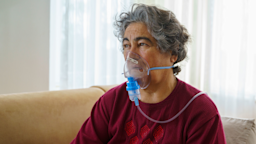Key takeaways:
Abrysvo and Arexvy are two FDA-approved respiratory syncytial virus (RSV) vaccines. They can both lower the risk of respiratory illness from RSV. Arexvy is FDA approved for certain adults age 50 and older. Abrysvo is approved for certain adults age 18 and older.
Abrysvo is also approved for use in pregnant women. Antibodies (immune memory cells) from the mother can pass to the fetus during pregnancy. This can help protect newborns during the first 6 months after birth.
Abrysvo and Arexvy are made differently, but they have similar side effects. These include pain at the injection site, muscle pain, and headache.
The CDC recommends a single dose of an RSV vaccine for adults age 75 and older. People 60 to 74 years old who are at an increased risk for severe RSV are also eligible. A single Abrysvo dose is recommended for pregnant women who are between 32 and 36 weeks of pregnancy.
After unsuccessful attempts to develop a safe and effective respiratory syncytial virus (RSV) vaccine in years prior, the FDA approved the first two RSV vaccines in 2023 — Arexvy and Abrysvo. The first RSV vaccine, Arexvy, was approved in May 2023. Abrysvo’s approval followed a few weeks later.
For most adults, RSV causes a mild cold-like illness. But some people, especially older adults, have a higher risk of serious illness. Babies are also particularly vulnerable to severe RSV. This is where RSV vaccines can provide an added layer of protection for those at higher risk.
So, how do you decide between Abrysvo and Arexvy? We discuss six ways they compare below.
Search and compare options
1. Arexvy is approved for adults 50 and older, while Abrysvo is approved for adults 18 and older
Abrysvo and Arexvy are both approved to lower the risk of respiratory illness from RSV in certain older adults. As mentioned above, older adults have a higher risk of severe RSV. This is because your immune system doesn’t work as well as you get older.
The most recent CDC RSV vaccine recommendations apply to certain people age 60 and older. Abrysvo and Arexvy are both approved for adults in this age group. But Arexvy is also approved for adults ages 50 to 59 who are at increased risk of severe RSV. And Abrysvo is also approved for people ages 18 to 59 who are at increased risk of severe RSV.
So, why is it important for older adults to get vaccinated against RSV? Sometimes, an RSV infection can lead to pneumonia or make existing health conditions worse. In fact, it’s estimated that up to 160,000 older adults require hospitalization from RSV each year. A recent CDC study found that the RSV vaccines were 75% effective against hospitalization from RSV in their first season of use.
2. Abrysvo is also approved for use during pregnancy to protect newborns after birth
In addition to older adults, babies are also at a higher risk of severe RSV. In this case, pregnant women can get an RSV vaccine later on during pregnancy to protect their babies after birth.
Similar to other vaccines given during pregnancy, babies can be protected for a period of time after they’re born through passive immunity. This is when antibodies (immune memory cells) from the mother pass to the fetus through the placenta during pregnancy.
In August 2023, the FDA approved a one-time shot of Abrysvo for pregnant women during weeks 32 to 36 of pregnancy. When given during this time, the vaccine can prevent respiratory illness from RSV through at least 6 months after the baby is born.
RSV in adults: You might think of respiratory syncytial virus (RSV) as being risky for babies. But adults can get RSV, too. Learn more about which adults have a higher risk of severe illness from RSV.
Can RSV turn into pneumonia? Learn more about who’s at risk and symptoms to look for, plus ways to stop it from happening.
What to expect: Learn more about RSV vaccine side effects and how to manage them, including injection site pain, headaches, and fatigue.
Abrysvo was studied in about 3,500 pregnant women. Compared to placebo (an injection without the vaccine), Abrysvo lowered the risk of respiratory illness from RSV in newborns by about 82% within 3 months after birth. And when the vaccine was given between weeks 32 and 36 of pregnancy, this risk was cut by about 91%.
Of note, there was a slightly higher percentage of preterm births in women who received Abrysvo compared to the placebo group during clinical trials. But it’s not clear if this was due to the vaccine or another cause.
3. Both Abrysvo and Arexvy can protect against serious respiratory illness from RSV
RSV can cause lower respiratory tract disease (LRTD) that can lead to life-threatening lung problems, including pneumonia. RSV vaccines can help lower the risk of LRTD from an RSV infection.
Read more like this
Explore these related articles, suggested for readers like you.
Abrysvo and Arexvy haven’t been directly compared to each other. So, we don’t know for sure if one vaccine works better than the other. But data from each vaccine’s clinical trials show they both work well to prevent serious respiratory illness from RSV.
Abrysvo was studied in about 17,000 adults who were at least 60 years old. Compared to placebo, the vaccine reduced the risk of RSV-LRTD with two or more symptoms by 67%. And for RSV-LTRD with three or more symptoms, the vaccine lowered the risk by 86%.
Arexvy has been studied in adults ages 60 years and older across multiple clinical trials. In one study of 12,500 people who received one dose of Arexvy, the vaccine lowered the risk of RSV-LRTD by about 83% overall compared to placebo.
Studies are ongoing to collect additional data on how well the vaccines work and how long protection lasts. However, clinical trial data has shown protection lasting through 23 months from Arexvy and through 18 months with Abrysvo.
4. Abrysvo and Arexvy both work in a similar way
Abrysvo and Arexvy are not live vaccines, meaning that they don’t contain a weakened form of RSV. Instead, they’re both recombinant subunit vaccines. This means they contain pieces of virus that are used to stimulate the immune system. In this case, the RSV vaccines contain a specific form of a protein (called prefusion or preF) that normally helps the virus attach to healthy cells and infect them.
When your immune cells detect the preF proteins from the vaccine, your body makes antibodies against them. This helps your immune system quickly identify and attack RSV if you’re exposed to it in the future. You can still get RSV, but there’s a lower chance that you’ll get seriously sick.
Good to know: A third RSV vaccine from Moderna, called mRESVIA, is also available. It’s a different type of vaccine than Abrysvo and Arexvy. It’s a messenger RNA (mRNA) vaccine, which uses similar technology as the Moderna COVID-19 vaccine.
5. Abrysvo and Arexvy contain different ingredients
Abrysvo and Arexvy are the same type of vaccine (recombinant subunit vaccine). But they’re made up of different ingredients.
Abrysvo is considered a bivalent vaccine. It contains preF proteins from two RSV subtypes: RSV A and RSV B. Arexvy also contains preF proteins, but it isn’t considered a bivalent vaccine. Even so, it has also been shown to protect against RSV A and RSV B.
Another difference between the RSV vaccines is that Arexvy contains an adjuvant. Adjuvants are substances that are sometimes added to vaccines to help them work better. Abrysvo does not contain an adjuvant.
Abrysvo and Arexvy are both preservative-free. However, they do contain additional ingredients that help with stability and acidity of the vaccine. These ingredients are listed in the table below.
Additional ingredients in Abrysvo | Additional ingredients in Arexvy |
|---|---|
Tromethamine | Trehalose |
If you’re allergic to any RSV vaccine ingredients, you shouldn’t receive that vaccine. Talk to your primary care provider if you have questions about which vaccine is safe for you to get.
6. Abrysvo and Arexvy can cause similar side effects
During clinical trials, people receiving Abrysvo or Arexvy reported similar side effects. The most common RSV vaccine side effects for older adults included:
Pain at the injection site
Feeling tired
Muscle pain
Headache
In addition to the side effects listed above, pregnant women receiving Abrsyvo also reported nausea. And while rare, serious side effects such as Guillain-Barré syndrome have been reported. Keep in mind that these aren’t all possible side effects from the vaccines.
You can’t get sick from either RSV vaccine, but you can feel lousy for a few days afterwards. If you experience any side effects after getting your shot, you can report it to the FDA and CDC. This helps them track vaccine safety on an ongoing basis. But if any side effects feel severe or life-threatening, get medical attention right away.
Who is eligible to receive an RSV vaccine?
The CDC currently recommends that adults age 75 and older receive one dose of an RSV vaccine. People who are 60 to 74 years old and at an increased risk of severe RSV are also eligible. As of right now, the RSV vaccine is given as a one-time dose. In other words, you don’t need to get the RSV vaccine again if you got it last season.
The CDC also recommends a single dose of Abrysvo, given September through January, for pregnant women who are between 32 and 36 weeks of pregnancy. If you’ve recently given birth, medications are available to help prevent severe RSV in newborns and infants entering their first RSV season. Talk to your healthcare team about your options and eligibility for RSV prevention. If you’ve received Abrysvo during a prior pregnancy, it’s not currently recommended to receive it again during subsequent pregnancies.
Who shouldn’t receive an RSV vaccine?
Most people who are eligible for one can receive an RSV vaccine. However, there are some situations where one or both vaccines may not be recommended:
If you’ve had a severe allergic reaction to any of the ingredients in Abrysvo or Arexvy
If you have a moderate or severe illness at the time of your vaccine appointment
If any of these apply to you, ask your healthcare team to see if you should either avoid the vaccine(s) or wait to get your dose.
How do you choose which RSV vaccine is right for you?
When deciding which RSV vaccine is right for you, there may be certain factors to consider. For example, Abrysvo and Arexvy contain different ingredients. This may be important if you have allergies. Otherwise, either vaccine should suffice for older adults. Abrysvo is the only option for pregnant women.
While both vaccines are approved, certain locations may carry one or the other — not both. And, it may not be clear which one is in stock. If you’re looking for a specific RSV vaccine, it may be worth calling ahead if the information isn’t available online.
The bottom line
Abrysvo and Arexvy are two FDA-approved respiratory syncytial virus (RSV) vaccines for certain older adults. Both vaccines work well to lower the risk of respiratory illness from RSV infection. Common side effects include injection site pain, fatigue, and headache.
For older adults, the CDC recommends an RSV vaccine dose for people age 75 and older. People who are 60 to 74 years old and at an increased risk of severe RSV are also eligible. And pregnant women who are between 32 and 36 weeks of pregnancy can receive a single dose of Abrysvo.

Why trust our experts?



References
Centers for Disease Control and Prevention. (2024). Adjuvants and vaccines.
Centers for Disease Control and Prevention. (2024). Immunity types.
Centers for Disease Control and Prevention. (2024). RSV in infants and young children.
Centers for Disease Control and Prevention. (2024). RSV in older adults.
Centers for Disease Control and Prevention. (2024). RSV vaccine guidance for older adults.
Centers for Disease Control and Prevention. (2024). RSV vaccine guidance for pregnant people.
Centers for Disease Control and Prevention. (2024). RSV vaccines.
Geagan, N. (2023). FDA review of efficacy and safety of AREXVY (RSVpreF3-AS01E) Biologics Licensing Application. U.S. Food and Drug Administration.
GlaxoSmithKline Biologicals SA. (2023). Arexvy- respiratory syncytial visus vaccine recombinant, adjuvanted kit [package insert]. DailyMed.
Jenkins, V. A., et al. (2023). The quest for a respiratory syncytial virus vaccine for older adults: Thinking beyond the F protein. Vaccines.
National Institute of Allergy and Infectious Diseases. (2019). Vaccine types.
Pfizer. (2024). U.S. FDA approves Pfizer’s RSV vaccine ABRYSVO® for adults aged 18 to 59 at increased risk for disease.
Pfizer Laboratories Div Pfizer Inc. (2024). Abrysvo- respiratory syncytial virus vaccine [package insert].
U.S. Department of Health and Human Services. (n.d.). Report an adverse event to VAERS.
U.S. Food and Drug Administration. (2023). FDA approves first vaccine for pregnant individuals to prevent RSV in infants.
U.S. Food and Drug Administration. (2024). Abrysvo.
Van Beueskom, M. (2024). RSV vaccine 75% effective against hospitalization in older adults, CDC study estimates. University of Minnesota Center for Infectious Disease Research and Policy.
Walsh, E. E., et al. (2023). Efficacy and safety of a bivalent RSV prefusion F vaccine in older adults. The New England Journal of Medicine.















